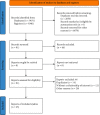Relationship between Emotional Eating, Consumption of Hyperpalatable Energy-Dense Foods, and Indicators of Nutritional Status: A Systematic Review
- PMID: 35634585
- PMCID: PMC9132695
- DOI: 10.1155/2022/4243868
Relationship between Emotional Eating, Consumption of Hyperpalatable Energy-Dense Foods, and Indicators of Nutritional Status: A Systematic Review
Abstract
People's health is closely linked to their diet. Diet can be defined as the set of foods that are consumed in a day, and it is susceptible to being altered by various factors, such as physiological, environmental, psychological, and social. These, in turn, can be affected by an inadequate diet and/or a dysregulation of emotions. Emotions are an immediate response by the organism informing it of the degree of favorability of a certain stimulus or situation. Moods are similar to emotions but more intense and prolonged. Some studies indicate that the consumption of hyperpalatable energy-dense foods may be related to emotional eating. Emotional eating is characterized by the excessive consumption of hyperpalatable energy-dense foods, rich in sugars and fats, in response to negative emotions. But several reports also indicate that emotional eating may be associated with the presence of positive emotions, so further analysis of the available information is necessary. Consuming higher amounts of hyperpalatable energy-dense foods can lead to the accumulation of energy in the body that results in an increase in body weight, as well as other associated diseases. Obesity is the world's leading diet-related health problem. The objective of this work was to carry out a systematic review of the available literature using the Cochrane methodology, in accordance with the PRISMA guidelines, to evaluate the relationship between emotional eating, the consumption of hyperpalatable energy-dense foods, and indicators of nutritional status. An exhaustive search in different databases yielded 9431 scientific articles, 45 of which met the inclusion criteria. This review underscores the fact that knowing and understanding the reasons why people consume hyperpalatable energy-dense foods and the possible connection with their emotional eating can provide key data for improving and personalizing patients' nutritional treatment. This in turn can encourage compliance with treatment plans to improve people's health and quality of life using an interdisciplinary approach.
Copyright © 2022 Cristina Elizabeth Fuente González et al.
Conflict of interest statement
The authors declare that there are no conflicts of interest regarding the publication of this paper.
Figures
References
-
- Peña Fernández E., Reidl Martínez L. M., Peña Fernández E., Reidl Martínez y L. M. Las emociones y la Conducta alimentaria. Acta de Investigación Psicológica . 2015;5(3):2182–2193. doi: 10.1016/s2007-4719(16)30008-4. - DOI
Publication types
MeSH terms
LinkOut - more resources
Full Text Sources
Miscellaneous



